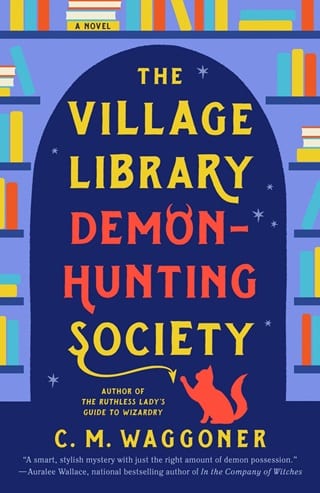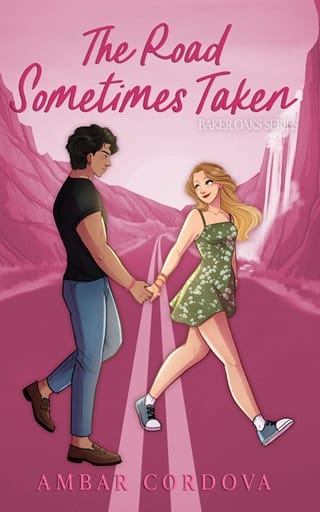Chapter Six
Six
Sherry glided through the next few days on the well-sharpened ice skates of self-satisfaction. She'd done well, she thought. Charlotte thought so, too. She bought that bottle of champagne that Sherry had advised her so strongly against just a few days before and invited Sherry over to drink it. When Sherry got there, those cold-looking nude women had been taken off the walls, and Charlotte was full of the sometimes-tearful giddiness of a woman who had come very close to being arrested for a murder she hadn't committed. They got tipsy together, and made morbid jokes that couldn't be repeated in mixed company, and talked about books and cackled like witches. "Is it awful of me to say that I'm so glad that I had this chance to get to know you?" Sherry asked, once the champagne was gone and Charlotte had mixed them up some spontaneous caipirinhas.
Charlotte gave a little shriek, then dissolved into laughter again. " Yes ," she said. "It's obviously awful, come on . You can't just say that you're grateful for someone getting murdered because of the friends you made along the way . God, poor John."
"Poor John," Sherry agreed. She felt suddenly odd. Frightened, maybe. "Charlotte—I'm probably being silly. But try to be careful, please?"
Charlotte frowned at her over the rim of her caipirinha glass. "Be careful of what?"
"I don't know," Sherry said. Her head was swimming. She didn't usually drink this much. "There's just—something. It feels like there's something to be careful of."
"By the pricking of your thumbs," Charlotte said, and gave another little giggle.
Sherry didn't laugh. "Maybe," she said. It was dark out now, dark enough that she couldn't see Winesap through Charlotte's living room window. All she could see was the reflection of her own pale, anxious face. "Maybe something wicked."
The next day was Saturday, which meant that she would have her date with Alan that evening. She woke up with her head already aching and full of more of that sense of dread that had started the night before, though now she supposed that she could blame it on her hangover. She was annoyed with the world and with herself. She was too old to drink enough to have a hangover on a day when she knew perfectly well that she had to work. Her trying to seem cool to her new young friend, probably. Embarrassing. She was embarrassed and anxious and her head hurt so badly even Lord Thomas Cromwell annoyed her. His yowls for his breakfast were too loud.
Alan was as wonderful as ever, at least. He took one look at her when she climbed into his car—their plan had been to drive to Saratoga to see a live jazz performance—and said, "I know that we said we'd go into the city tonight, but what would you think about just having a night in? We could pick up Chinese and eat it on my couch in front of a movie."
"That sounds perfect ," Sherry said, the words coming out in a big relieved sigh. Then she confessed, "I have a hangover. Isn't that embarrassing?"
"Extremely embarrassing," he said. "I can't stand to be seen with you. Get out of my car." He pulled carefully out of the library parking lot. NPR was on the radio. "I've been tiring myself out over the books for the store all day. I'll probably be worrying about them all night, too, so I thought I might as well take a break for a few and not bother with all of that driving back and forth. Why do you have a hangover? Hitting the clubs last night?"
Sherry blushed, which was fairly novel. Only Alan ever usually managed to make her blush. Most of the time she was almost completely shameless. She tried to evade the question. "Are things not going well with the store?"
She could see his frown reflected in the windshield. "Just some strange things I'm trying to figure out. And I had to talk to Alice about paying attention to what she's doing. She was doing more daydreaming than working today." Then: "You just changed the subject. Do you have another guy on the side who takes you to all of the wild Winesap parties?" He was teasing, obviously, but it made her blush harder, anyway.
"Charlotte invited me over for drinks."
"Charlotte Jacobs?" Alan asked, shifting slightly to look at her. "The merry widow?"
"Don't call her that," Sherry said, her tone more redolent of the scolding wife than what she'd intended. "She's not a merry widow ." She then had to immediately amend that for the sake of truthfulness. "She's not an… excessively merry widow. And, anyway, she didn't do it. Didn't you see the news? They caught the real killer."
" You caught her, you mean," Alan said. "Of course I saw. I always check the paper for news about your cases. I'm just mad that I was wrong about one of them again. You'd think that I'd get it right sometimes . Charlotte really looked like the obvious suspect."
Your cases. Sherry blushed again. It was nice of him, she thought, to treat her… detective-ing as if it was real. Something to be taken seriously. "It never seems to be the obvious suspect," she said absently. She was distracted by the fact that they were pulling into the parking lot of Winesap's lone, small Chinese restaurant. "Steamed dumplings?"
"I'll get a dozen," Alan said. "Should I just run in and order? You can stay in the car, unless you'd rather come in with me. It's frigid out there tonight."
"That would be nice of you," Sherry said, feeling warm and comforted and pampered in the way that Alan always seemed to manage. "If you don't mind?"
"Not at all," he said, and kissed her cheek, then clambered out of the car—a blast of cold air carried in a few stray snowflakes—and jogged into the restaurant. Sherry put her fingertips to where Alan had kissed her, like a young girl in an old movie, and then immediately dropped her hand into her lap. Ridiculous. She was being ridiculous.
Alan was always so nice to her. Her headache felt like it was easing. She sat in the car and listened to the radio until he returned, laden with bags and looking eager and pleased, his cheeks flushed from the cold. With the gray mustache, it ought to have made him look like Santa Claus. Sherry thought it made him look like the sweet, earnest boy he must have been half a century ago. On the drive he talked her ear off about a Sichuan restaurant down in Albany that he wanted to take her to the next time they went down for the symphony. He seemed to be under the impression that she had never eaten Sichuan food before, and he was very eager to introduce her to the cuisine. She didn't have the heart to tell him that she'd spent a good amount of time while she was living in New York City eating her way through Flushing. Alan was always so happy when he could present her with a delightful surprise. She wouldn't deny him the pleasure for a minute, even if it meant pretending to be overwhelmed by what she expected would be underwhelming dandan noodles.
They went to his house, which was elegant and comfortable, packed with books and antiques and expensive old rugs. He set a stack of documents down on a side table, then showed her a new drawing he had on the wall, a picture of two cowboys with a wild horse that he'd pulled from a set of six framed original illustrations from a book about the American West that his son Corey had brought in a few weeks earlier. "I felt bad for breaking up the set, but I really loved this one. It reminded me of something from a novel." Sherry made agreeable noises. The picture didn't strike her as anything special, but she liked seeing how genuinely excited he looked about it, and the way that he bragged about Corey's talent for reframing old pictures—the frame did look nice—struck her as very sweet.
They sat on his big squishy old sofa to eat their Chinese food and watch a movie. At a certain point in the evening it only seemed natural to start making out like teenagers, which was something that they'd never done before. She'd always wriggled her way out of it before, always gone in for a hug when she'd sensed him wanting a kiss. She didn't wriggle now. She kissed back. It was hopelessly silly. It was fantastic. Sherry blushed and giggled and, eventually, let her head settle on his shoulder to rest between kisses. She held his hand. It was ridiculous of her, she knew that. Even forty years ago she never felt as if she was quite pretty enough to blush and giggle over a boy without embarrassing herself. The main difference, maybe, was that she was even less pretty now and cared much less about being embarrassing.
At about ten Alan drove her home through what was rapidly turning into a blizzard with some leftovers nicely packed up for her—"so you won't have to cook for yourself tomorrow"—and kissed her goodbye on her doorstep. Then he left, and Sherry trudged across the road to offer the leftovers to Alice. She would take them, she knew: Alice hated to cook but was also constantly pinching her pennies, so Sherry had gotten into the habit of giving her food under the pretext that she didn't like reheated food but hated to waste anything.
Alice opened the door a few moments after her knock and accepted the leftovers with a level of gratitude that suggested to Sherry that she hadn't had anything for dinner yet. She very politely invited Sherry inside. Sherry just as politely refused, then spent a stupid, giddy few moments babbling about her date, and how nice it had been, and "Poor Alan's still going to be up for a while working on his books for the shop; I don't think he's very good at running the business end of things, he really just loves the antiques—" when it occurred to her that Alice probably had better things to do than stand in her doorway and listen to her neighbor babble about her boss . Alice did work for Alan, after all, and might therefore find him slightly less adorable than Sherry did.
"Aw, poor guy," Alice said, with a sympathetic little grimace. "That stuff sounds awful. I'm glad that I'm not the boss: I'd probably get in trouble with the IRS for messing up all of the records and, uh, not keeping all of my receipts, or whatever you're supposed to do."
Sherry made the appropriate noises of agreement at that: she, too, had never managed to figure out exactly which receipts she was supposed to be saving. Then she made her way back home—the snow was falling so hard and fast now that it took her what felt like half an hour just to creep across the road and up her own driveway—washed her face and brushed her teeth, and joined Lord Thomas Cromwell in bed. She still felt nice and warm from the memory of her evening with Alan. "Lord Thomas," she said aloud, "would you get mad at me if I brought another man home one night?"
Lord Thomas didn't reply. He did use his claws quite a bit as he kneaded her thigh with his pointy little paws.
"Jealousy is a very ugly emotion, Lord Thomas," Sherry told him, and then petted his soft head until they both fell asleep.
She woke up again in a drugged-feeling haze and looked toward the clock on her bedside table: 12:12. She thought, Make a wish, Sherry . Or was that just 11:11? She wasn't sure what had woken her up, at first, and then she heard another knock on her door, another insistent drrring-drrring! from the jangly old bell. She got up and pulled her robe and slippers on to go see who it was, then turned into a frightened old lady and peeped through the curtains before she opened the door, just in case it was a robber. It wasn't a robber. It was Alice, looking very cold and distraught. A small domestic catastrophe! Her electricity had gone out. Had Sherry's? No, Sherry still had power: a line hadn't gone down in the storm. Had Alice checked her fuse box? Alice didn't know where that was, or how to check it. Sherry to the rescue! She located her big heavy flashlight, bundled herself up, and led the way down into Alice's basement to locate the breaker box, then flipped the right switch with a bit of a magician's showmanship. The power back on, Alice exhibited repentance. She never should have plugged in that space heater, she should know how to fix things on her own, et cetera. Sherry, who was enjoying feeling very competent, heroic, gentlemanly, et cetera, dismissed her apologies. "Anytime!" she said, and left the big flashlight with Alice in case of another space heater catastrophe, before she made her way back home. The snow was finally starting to slow a little. Maybe the roads would be clear in the morning.
Sherry got back into bed, and, for once, fell asleep almost immediately. She woke up again before her alarm, feeling still tired but cheerful. It was, at last, bright and blue outside, the morning light reflecting against the snow so that her whole house was soaked with sunlight coming through the east-facing windows. She found some upbeat folk music on the radio and was bopping happily around her kitchen while she made her coffee and soft-boiled eggs when there was a knock at the door.
She blinked, and answered it, then frowned. It was Sheriff Brown. "Good morning," she said, after a moment. She felt uneasy. Sheriff Brown generally did his utmost to avoid Sherry becoming involved in his affairs. Even an unprompted phone call would be unusual. His appearance at her door was unnerving at best. Her body knew it better than her head did. Her mouth asked the question before her mind could catch up. "Someone was killed again, weren't they?"
Sheriff Brown clenched his lips up like a fist, then took a deep breath. "I'm sorry, Sherry," he said. "It's Alan Thompson."
The part of Sherry that was always just outside of everything, the part that was quietly taking notes in the back of the classroom, the part that volunteered to take the photo, the part that stood behind the table at the prom and ladled out the punch—that part of Sherry thought, I didn't know that someone's knees really could buckle. I didn't know what they meant when they said that their stomach fell through the floor.
Sheriff Brown caught her by the elbow. He was talking and walking her back into her house. But I haven't cleaned , she thought. He was seeing her house for the first time before she'd had the chance to clean. He was still talking, talking. The body was found at seven this morning when the mailman noticed that the front-door glass had been smashed. Sherry was sitting in her favorite chair now. It suddenly felt unbearable to be touching it, as if it was grabbing at her. She jumped to her feet, then fell back into the chair again when she felt as if she didn't have the strength in her legs to stand. "But it can't be," she said. "It can't be Alan." Her throat was tight and achy. "It's never anyone who I—"
She stopped. The horror of it was clear now, clearer than it had ever been. All these people dying. There was death after death, murder after murder in tiny little Winesap, but it was true , it had never felt real, because it was never anyone Sherry cared about. A village with a population of under five thousand people, and there was somehow always someone who was new in town or whom Sherry had never spoken to or whom she didn't like very much available to be murdered in an interesting way. And then Sherry would solve it. She always solved it. She'd solved—the cases were starting to come back to her. There were so many. They'd faded into something vague and indistinct in her head, but now she could remember them. She started to count, then gave up at sixteen. Sixteen deaths. Sixteen corpses. It would be an alarming number in a city twenty times the size. How on earth had they all taken this so calmly for so long? It was unnatural, monstrous , so strange and callous that it didn't make any sense. Sixteen deaths, and somehow every single time Sherry had ended up involved in the investigation, and every single time she'd been able to crack the case without any particular difficulty or sacrifice. She'd always just been the smartest person involved, always been a step ahead of both the killer and the police. The trouble was that Sherry knew herself, and she'd never been that smart. She was just normal. A normal, average, endearingly disorganized librarian for whom odd coincidences always led to her solving murder cases. Like something from a TV show, or an Agatha Christie novel. Like some sort of horrible game.
Something wicked , she'd said to Charlotte the other night. Maybe something wicked.
Sheriff Brown was still talking, but she wasn't really listening. She felt out of her mind and more focused than she'd ever been. Something wicked. There was something terrible happening in Winesap, something much bigger than Sherry or Winesap or even each individual death. But what could it possibly be? An elaborate pay-to-kill club for wealthy sociopaths? A serial killer who framed people and then convinced them to confess? A long-running reality TV show with staged murders and Sherry as the unwitting star? Village-wide ergot poisoning causing mass homicidal hallucinations? None of her ideas made any sense, but neither did the reality. She was still running in mental circles when something Sheriff Brown said finally broke through the sound of her own heartbeat. "Will you help investigate?"
She recoiled. " No ," she said, and gave him what she was sure was a transparently horrified look. "Why would you—you normally don't want me anywhere near your cases, and now—isn't it conflict of—he was my—" Her voice cracked. She stopped, looked down, and blinked hard. He hadn't been her anything, really. She'd never admitted it to herself, but it had been all down to her fear of getting herself stuck in another awful relationship that she'd kept Alan at arm's length for so long. She'd been afraid of letting him get too close, but he'd gotten close, anyway. And now he was gone. He was gone forever. All of his kindness and fussiness and pointless knowledge of very serious novels that he never even liked very much. She'd been trying to get him to read more of the sorts of things that he really enjoyed. She'd been tempting him with Lonesome Dove . He was gone now. He'd never get to sit in his favorite chair and read a story about cowboys again. He'd never get to imagine himself rugged and brave and riding high in the saddle somewhere under a wide blue sky.
Maybe he didn't have to imagine it now. Maybe he was already there, finding out what sagebrush smelled like.
Eventually Sheriff Brown left. Sherry barely registered his leaving. She went right back to bed.
She stayed in bed for the next few hours. She didn't read or sleep. She just lay there and looked at nothing and thought about nothing. Her head ached. Eventually her phone started to ring. She listened to it ring, dully hating the sound of it. The ringing stopped, then started again. The third time that it stopped and started she got up to answer it, with the vague idea that she might be able to convince whoever was on the other end of the line to leave her the hell alone.
It was Janine, sounding worried and gentle and sympathetic. "Sherry, I just heard, I'm so sorry," she said. "Is there anything that I can do? God, that's a useless question, isn't it. Can I bring some food over? I could make some chicken soup for you."
"No, thank you," Sherry said. "I just—need some time." She wasn't crying. She wondered if that meant that there was something wrong with her. Something about her that was broken or had never formed correctly. She could solve a murder, but she couldn't mourn a death. Not very feminine, maybe. Not the sort of woman who was worthy of a good man, and God , how disgustingly narcissistic to turn Alan's death into a referendum on herself. She felt tired and sick to her stomach. She said, "I just need time."
"If you're sure," Janine said after a short pause. "Maybe I could bring you some lunch tomorrow?"
"All right," Sherry said. Maybe if she agreed, Janine would leave her alone.
"Are there any suspects yet?" Janine asked.
"I don't know," Sherry said. Maybe she was going to throw up.
"But aren't you investigating?" Janine asked.
" No ," Sherry said. She was going to throw up. "Janine, it's Alan , I couldn't—do you want me to go look at the crime scene? I was just there last night, we—"
"But you will investigate, won't you?" Janine's voice sounded strange. Not flat. The opposite of that, like an actor in a local Winesap production of a too-ambitious modern play. The emotion was spread on too thickly.
" No ," Sherry said. "And please stop asking. My boyfriend just died , Janine." She'd never called Alan her boyfriend before. It was too late to matter now. Too late, too late—
"But you're so good at it," Janine said. "Aren't you worried about finding his killer? Don't you want justice? Didn't you love him?" She sounded even less like herself now, harsh and loud and shrill. There was a strange metallic quality to her voice that Sherry didn't think was coming from the speaker of Sherry's old telephone.
" Stop ," Sherry said. " Stop , you're being cruel —" And had she loved him, really? Could she have loved him, if she'd let herself? She couldn't anyway now, it was too late, it was too late for Alan, Sherry could solve a murder but she couldn't fucking well stop one —
" You have to investigate, Sherry ," Janine said. Her voice shrieked like glass breaking and metal tearing. Like a car crash. "You have to, you have to investigate the crime , your job is to solve the murder , you have to investigate the murder —"
Sherry hung up on her. Then she dashed to the bathroom to throw up until there was nothing left in her stomach.
 Fullepub
Fullepub 



